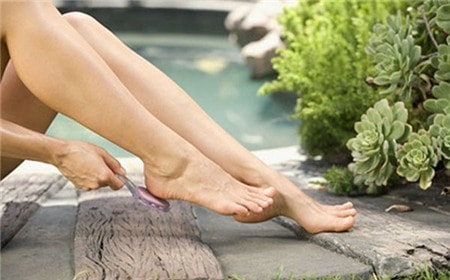The Truth Behind Heel Pain
Did you know that heel pain is not just simply pain in the foot, it can also be related to other internal organs in the body, even caused by blockages in the body.
If you want to know more about heel pain symptoms and their causes, please refer to the following article.
 The heel is a very small part of the body, but when there is pain in the heel, it can affect the whole body. Illustration photo
The heel is a very small part of the body, but when there is pain in the heel, it can affect the whole body. Illustration photo
Common symptoms of heel pain
Heel pain is a very common symptom that can occur in people of all ages, especially in people of middle age and older.
Heel pain often starts with a mild pain in one leg and if not treated quickly, the pain will become more severe. Heel pain can be accompanied by swelling of the foot, and the pain may spread to other areas around the ankle.
Some people with heel pain also feel extreme pain when standing up and walking or after sitting or lying down. Others may feel sharp pain after standing for too long.
However, most people with heel pain feel no pain when sleeping or resting.
Causes of heel pain
1. Weak kidneys
According to Oriental medicine, the kidneys are connected to the heels, and blood flow from the kidneys even travels down to the feet, providing nutrients to nourish the bones. When the kidneys are weakened, the kidney's energy is not enough to supply blood to the feet, resulting in pain in the feet and heels. This pain will increase if you stand or walk for a long time and will decrease if you let your feet rest.
In addition to heel pain, weak kidneys can also cause the following symptoms: lack of energy for the body, lower back pain, weak legs, difficulty lifting legs, frequent urination at night, waking up early, poor memory, decreased sexual desire, early menopause...
To reduce heel pain as well as pain in other parts of the body, you need to:
- Protect your back when doing things like exercising, walking, working...
- To let your back and legs rest after heavy activity or long hours of work.
- Make sure you get a good night's sleep, especially early in the morning.
- Eat foods that provide energy for the kidneys such as beef bone soup, shrimp, clams, soybeans or tofu...
2. Poor blood circulation
This is also a very common cause of heel pain. It is often associated with an old injury that may have occurred in the lower part of the body (e.g., in the lower back, hips, legs, etc.). If this injury is not treated effectively, it can cause poor blood circulation, or even blockage of blood circulation in the body. This can affect the blood supply to the heel, causing heel pain.
If your heel pain is caused by poor blood circulation in your body, the pain will increase when you stand up after sitting or lie down after standing for a long time. In severe cases, the pain may be felt in the entire heel rather than in one spot.
To overcome heel pain caused by poor blood circulation in the body, you need to:
- Heal old injuries while treating heel pain.
- Exercise the lower body properly to improve circulation and stabilize blood supply to the heels.
- Avoid standing on cold floors/surfaces with bare feet.
- Soak feet in warm water for 20 minutes every day when in pain.
In addition to the two main causes mentioned above, a number of other factors can also contribute to heel pain, including: Foot infections, standing for long periods of time or walking a lot with uncomfortable shoes...
If you have applied simple methods but after 1 month the pain in your heel still does not improve, you should see a doctor for the most active and effective treatment.
According to Young Intellectuals - PC






